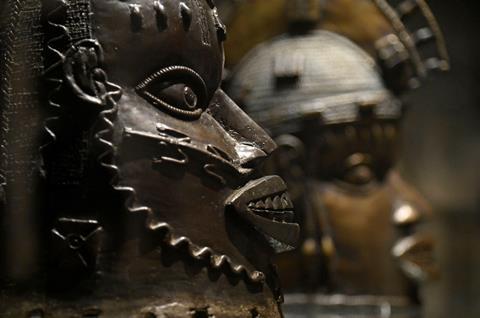Oyindamola Fakeye, the executive and artistic director at the Centre for Contemporary Art in Lagos, explains why we should get behind efforts to decolonise the British Museum.

As someone who was born and raised in the UK and now lives and works in the arts in Nigeria, I’m invested in the idea of decolonising museums.
When I think back to some of my favourite experiences growing up, many of them include time spent in galleries and museums in and around London. It was the free access to the museum collections that fostered my love for the arts and influenced my eventual career path. How then could I believe that these museums need to be decolonised having benefitted from their collections?
I, like some, wondered if it made sense to send priceless objects back to spaces that had no infrastructure to properly receive and house them. The fear that items could be lost, stolen on damaged were top of mind, which is a fair perspective, but does not make it right. I mean, if a child was stolen at birth and the family wanted that child back would they be in the wrong?
I don’t believe that harbouring stolen goods, especially when they come at the price of communities being slaughter or sold into slavery, aligns with our values.
I don’t believe that harbouring stolen goods, especially when they come at the price of communities being slaughter or sold into slavery, aligns with our values. To add some perspective: “Could you support a museum in Russia benefitting from items stolen from the recent war in Ukraine?” We encounter many characters in the Bible who had either stolen or defrauded people out of income, for those that weren’t killed the Bible reveals that they were encouraged to return the goods and in certain occasions provide a monetary restitution up to seven times the initial gain (Exodus 22:1-9, Proverbs 6:30-31, Luke 19: 8).
What decolonising looks like in practice however is not about the emptying of museums, first off it allows for items to be interpretated correctly with the right classification for their use. Museums provide a great environment for learning, especially by those who may struggle with traditional classroom methods, but many of the items are wrongly named and in some cases displayed back to front or upside down!
Read more on racial justice
Five tips for talking to your child about race
‘The default is white British, and everything else is different and other’
A group working to facilitate the return of the Benin Bronzes recently launched a digital library, which features artefacts in museum collections around the world, so instead of these items being returned they remain on display in the countries but “on loan”. In the case of the British Museum’s collection some of the artefact also have spiritual connotations; idols and religious items that according to local communities were not built to last. I believe these items should be returned to their communities who can make the decision what should be done with them.
Last year I spent time learning about “shmita” which refers to a sabbatical year. One thing I always loved about the season was that it represented a time of restoration. I think the decolonising debate provides an opportunity for restoration; I’ve witnessed a renewed sense of pride from communities who have the opportunity to properly share their historic narrative.
I think the decolonising debate provides an opportunity for restoration.
I recently took my team on a day trip to the new John Randal Centre for Yoruba Culture and History in Lagos, a world-class purpose-built institution. The Museum is made up of a few commissioned pieces and works from the national museum however many of the items were from the British Museum, items that would otherwise have sat in storage due to the limited display space available for exhibitions.
The fact that the majority of museum collections goes unseen meant that this opportunity to display the works at the new museum has opened up the experience to new audiences. As I made my way through the exhibit, I felt the wonder and awe rise up within me and witnessed the same in my team, the space truly is world class. I think it’s important for people on the continent, and especially those communities the items were taken from, to have opportunities to connect with their histories and most importantly - on their own terms.


































No comments yet